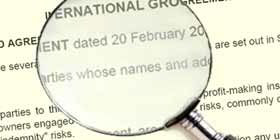The European Commission has launched a new probe into competition restricting agreements between the 13 members clubs of the International Group protection and indemnity cartel.
Competition officials have recently been canvassing shipowner views on the P&I cartel so the investigation is no surprise.
But the P&I cartel had been hopeful that a formal antitrust investigation could be avoided under a procedure that allowed existing exemptions from competition policy requirements to roll forward on expiry.

The clubs also operate premium price fixing arrangements that prevent a member club undercutting a rival’s quotation at the common 20 February renewal of cover.
So the International Group’s hope that an investigation could be side stepped always looked ambitious.
The clubs were last granted an exemption from the European Union’s antitrust rules in 1999 after a lengthy probe triggered by complaints from Greek shipowners.
It now looks as if the P&I clubs are in for a taxing investigation such as that which took place over several years through the latter part of the 1990s.
The European Commission said the opening of antitrust proceedings does not imply any conclusive proof of infringement of competition rules.
The investigation will also look into the question of whether the International Group P&I cartel is a bar to entry to ship liability insurance and whether the arrangement works to the disadvantage of other P&I insurance facilities and the commercial insurance market.
The P&I clubs co-operate under two separate deals, the International Group Agreement and the Pooling Agreement that contain rules on the sharing of insurance claims above $8m and joint purchasing of the world’s biggest reinsurance programme.
The clubs argue that the price fixing arrangement that prevents clubs undercutting rival International Group renewal quotations is a necessary corollary to this close co-operation.
The terms of the International Group Agreement are widely known but the details of the Pooling Agreement are closely guarded so the subject of some suspicion.
The International Group said the antitrust probe was not prompted by a complaint about the group's arrangements and claimed it was normal practice for the commission to review the expired exemptions.
“The agreements are not automatically covered by the new antitrust block exemption for the insurance sector that came into force in April. This is because the market share concerned is well above the 20% to 25% ceilings provided in the block exemption,” the European Commission said in a statement.


